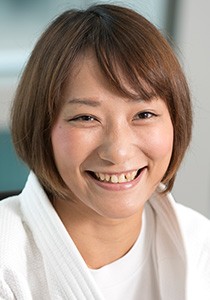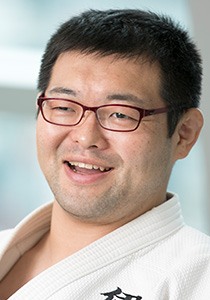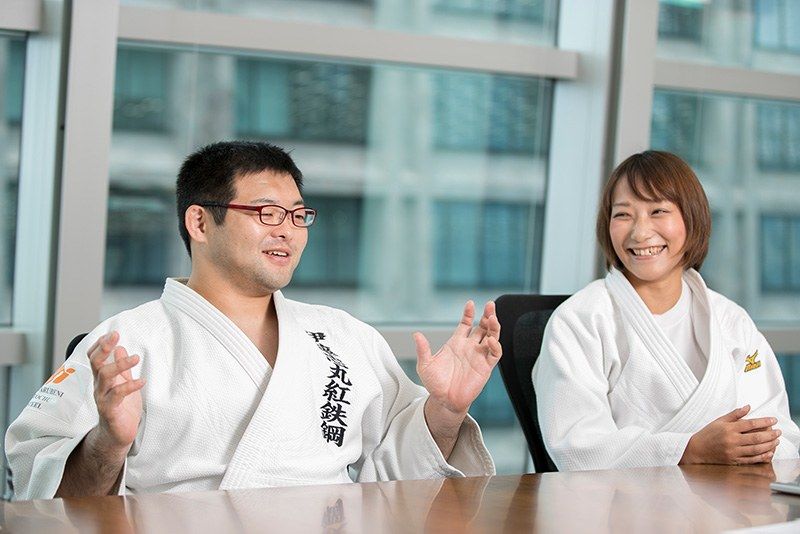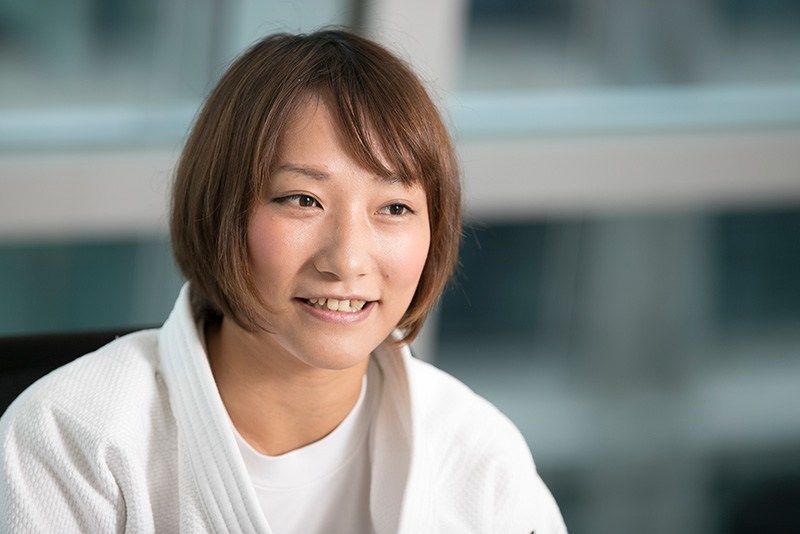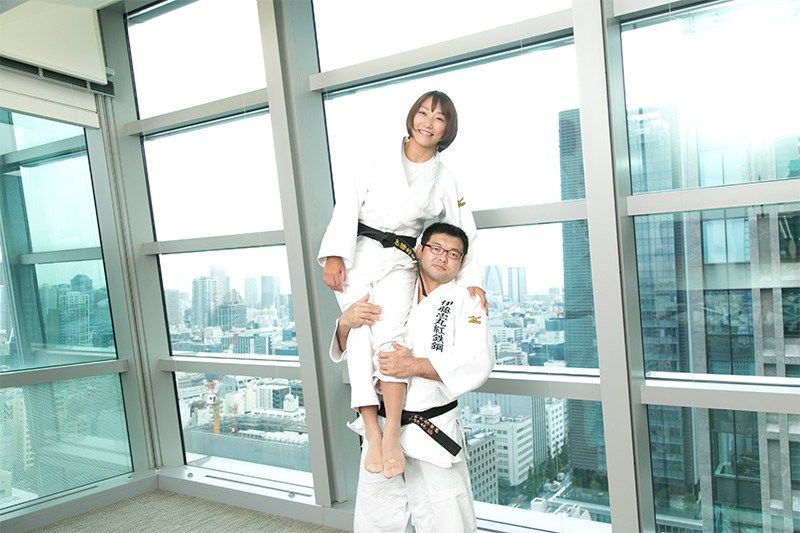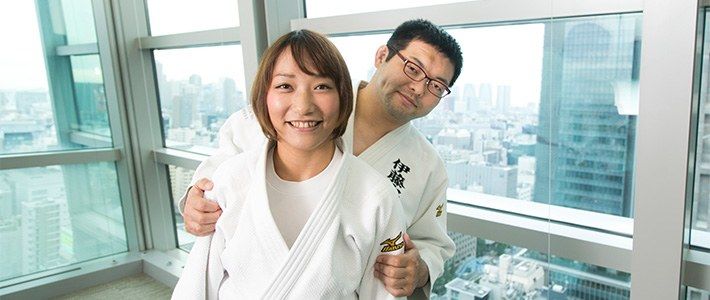
Paralympic Athletes, Up Close and Personal
Paralympic Might: Dynamic Jūdō Duo Hirose Haruka and Hirose Junko
Sports Tokyo 2020 Society Family- English
- 日本語
- 简体字
- 繁體字
- Français
- Español
- العربية
- Русский
A Medal for Two
Speaking with jūdōka duo Hirose Haruka and Hirose Junko, I am struck by the deep trust the couple share. In 2016 the husband-and-wife pair represented Japan at the Rio Paralympics Games—Haruka in the men’s 90-kilogram division and Junko in the women’s 57-kilogram division—and it was their bond that helped bring home a bronze.
Junko, whose third-place medal was Japan’s first-ever Paralympic in women’s visually impaired jūdō, firmly credits her husband for setting the stage for her achievement. “I would’ve never medaled if it weren’t for Haruka,” she insists. Grinning, Haruka warmly interjects, “You’ve got that right.”
Junko says she was realistic about her chances heading into the tournament—she did not even rank among the top three athletes in her division—but after winning her first match she found herself in the quarterfinals against Brazilian Lucia Araujo. However, facing a tough opponent backed by a frantically cheering home crowd threw her off her game and she was knocked out of the running for gold. Deflated, she headed into the repechage round.
Haruka immediately sensed something was wrong. “I could only vaguely make out her face on the venue’s display,” he says, “but it was clear the loss had rattled her. She was absolutely ashen.” He raced to her side, but instead of consoling her he advised her to firm up her guard.
The pep talk shook Junko from her stupor, and she went into the third-place match feeling reenergized. Facing Spain’s Maria Monica Merenciano Herrero, an opponent she had yet to beat, she flung the Spaniard to the mat with a well-practiced one-arm shoulder throw and held her down for an ippon victory and bronze medal.
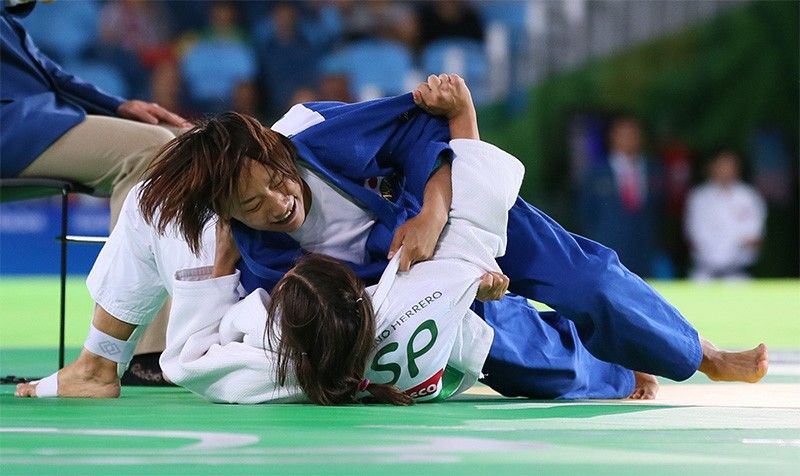 Hirose Junko holds her opponent on the mat to win bronze in the women’s 57-kilogram division at the 2016 Rio Paralympic Games. (© Jiji)
Hirose Junko holds her opponent on the mat to win bronze in the women’s 57-kilogram division at the 2016 Rio Paralympic Games. (© Jiji)
Hard Work Beats Talent
Haruka is unphased by his disappointing ninth-place finish at Rio, and instead takes pride in Junko’s victory, insisting that it was no fluke. “After qualifying together for the Paralympics,” he says, “I though one of us should come home with a medal. I believed my wife had a better chance, so I used my own practice time to also help her train.”
As an athlete he is aware that putting Junko’s performance ahead of his own flies in the face of common sense. “It’s not that I’m disinterested in how I do in competition,” he exclaims. “But if our approach to jūdō is going to gain traction, then one of us has to medal. And the truth of the matter is that my wife has a better chance.”
Haruka’s reasoning comes from a strong conviction that hard work will always trump talent. Along with jūdō, he is gifted at Brazilian jujitsu and competes in mixed martial arts. However, he says his natural ability pales in comparison to his wife’s drive to get better. “No matter how much she wins, she is always after me to teach her a new hold or technique,” he explains, adding this was even the case after she claimed the gold at the IBSA Jūdō World Cup in Turkey in April. “If I had just become world champion,” he chuckles, “training would be the last thing on my mind.”
A New Vision
Junko was born and raised in Yamaguchi Prefecture. As a fifth grader, she was inspired to take up jūdō in part by Kawamura Mika’s manga Awasete ippon, which tells a romantic tale of a female high school jūdōka. Although a comparative latecomer to the sport, her propensity for hard work in a few years earned her a berth at the national high school championships.
She continued to train, but her situation changed drastically in her first year of university when adult-onset Still’s disease, a rare autoinflammatory condition, caused her eyesight to deteriorate. Although a correctable condition, Junko did not respond to treatment as hoped. “The doctors assured me I would make a full recovery,” she explains. “But my eyesight did not return to what it was.” Even so, Junko remained upbeat. “It might have been different if an accident had suddenly robbed me of my vision. But as it was, I mostly took it in stride. “
Although an optimist, Junko knew she had to adjust to her situation. “I was scared that my condition would limit the direction I could take in life.” Then in 2012, as a favor to a friend, she helped out at a match of the Japanese women’s goalball team, which had won the gold medal at the London Paralympic Games. As she watched the players hustle on the court, the sights, sounds, and smells of her years of jūdō came flooding back. “It was a turning point for me,” she declares. In that instant she decided to return to competition.
“Watching the goalball team gave me a whole new outlook. It convinced me that I should forge ahead with jūdō.” After graduating from university, she took a job at a major insurance firm in Tokyo and poured her heart into training.
Changing Tracks
Haruka grew up in the city of Matsuyama in Ehime Prefecture. He started jūdō while in the second grade of elementary school, and in his teens he competed at the high school nationals. He says that as a youth he did “nothing else but train.” He cared little for the long, hard hours of practice, though, and admits that being diagnosed with glaucoma in high school gave him a welcome reason to quit. “I was more relived to give up jūdō than I was scared of losing my vision.”
After high school, Haruka began studying to be an acupuncturist at the prefectural school for the blind in Matsuyama. One day his instructor pulled him aside and encouraged him to try out for the Paralympic jūdō team. Haruka confesses that the thought had never occurred to him, but that the gentle push from his teacher convinced him to return to the mat.
Visually impaired jūdō is nearly identical to its able-bodied counterpart. Blind and partially sighted athletes compete together in various weight divisions—seven for men and six for women. The most obvious difference is that instead of standing apart, competitors start facing each other holding the sleeve and lapel of their foe.
Since resuming jūdō, Haruka has changed his practice style. Instead of relentlessly hard training, he now focuses on enjoying the sport—call it a “sweat and smiles” approach. In 2008, this new tactic propelled him to a fifth-place finish at the Beijing Paralympic Games.
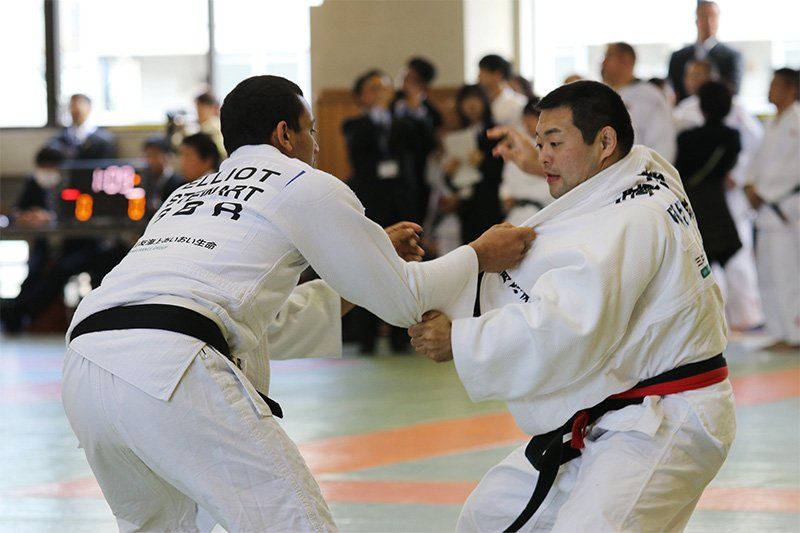 Hirose Haruka grapples with an opponent during the All Japan Jūdō Championship for the Blind and Visually Impaired in November 2017.
Hirose Haruka grapples with an opponent during the All Japan Jūdō Championship for the Blind and Visually Impaired in November 2017.
Black-Belt Matrimony
The Hiroses first met while competing for the Japanese national team at a tournament in the United States in the summer of 2013. Junko confesses that she was taken with Haruka right from the start but was too shy to approach him. Chuckling, she says that “he was a central figure on the team, but I basically ignored him the entire first day of the trip.” However, it was not long before Haruka’s natural cheery disposition and kindness wore down her guard.
Soon after the tournament the couple began dating, although with Haruka in Ehime and Junko in Tokyo, it was a long-distance relationship. The pair had a lot in common, though, and tried to make the most of the few times they could meet during the year.
But being apart proved difficult; after two years, Haruka suggested calling it quits. Junko was inclined to agree, reasoning that it would be better for both of them to focus on preparing for the Rio games. However, she followed her heart, and instead of separating she proposed on the spot. It took only a day for Haruka to decide to say yes.
In a rush of activity, Junko quit her Tokyo job, packed her belongings, and moved to Matsuyama. Shortly after their wedding, the Hiroses received an offer of sponsorship from Marubeni-Itōchū Steel, and are now training for the Tokyo games in 2020. “It would be great if we both could be champions, but I have to be realistic about my chances,” explains Haruka. “My goal is to give it my all, and for Junko to win gold.”
As the 2020 Paralympics approach, the Hiroses will be a team to watch, both on and off the mat.
(Originally published in Japanese. Interview photos by Kawamoto Seiya, unless otherwise noted.)
